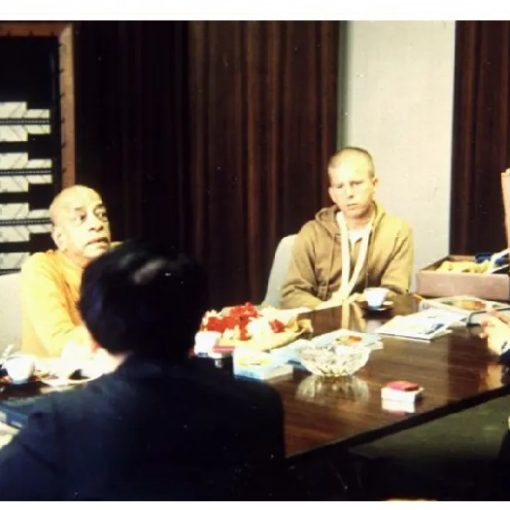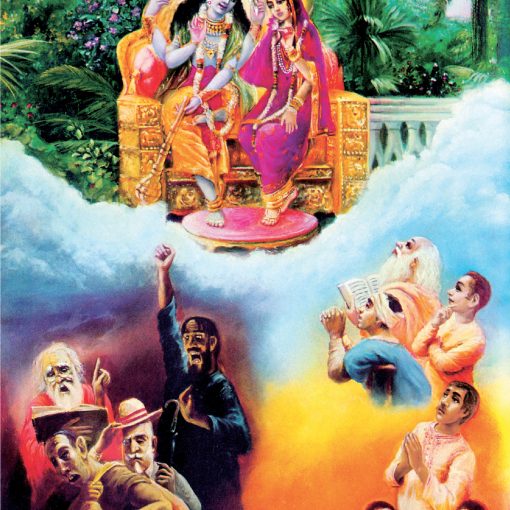Awakening from the Illusion: Redirecting Life from Material Pursuits to Spiritual Fulfillment”
In today’s fast-paced world, life often becomes a cycle of mundane tasks, with the majority of people dedicating their time to making money and meeting family responsibilities by day, and indulging in sleep or other distractions by night. This repetitive pattern is precisely what Srimad Bhagavatam (2.1.3) seeks to address, urging us to reconsider how we use the precious gift of human life. This blog post examines the Bhagavatam’s guidance on moving away from purely material pursuits and embracing a path of spiritual growth and self-discovery.
The Cycle of Material Life: A Loop of Temporary Satisfaction
The verse describes the life of the grihamedhi, or materially engrossed householder, whose day and night pass with little spiritual awareness. The SB 2.1.3 reads:
“The lifetime of such an envious householder is passed at night either in sleeping or in sex indulgence, and in the daytime either in making money or maintaining family members.”
In this way, grihamedhis are locked in a cycle of physical pleasure, economic development, and family duties, focusing on short-term satisfactions that ultimately bring little inner peace. This lifestyle is common across modern society, where material goals often take precedence over spiritual fulfillment. However, Srimad Bhagavatam encourages us to step beyond this loop of temporary pleasures and to pursue higher, lasting happiness that lies in spiritual awareness and understanding.
The Call for Spiritual Awareness: Atma-Tattva Knowledge
According to the Vedic scriptures, human life is unique because it offers the opportunity to understand atma-tattva, the science of the self. Atma-tattva is the knowledge that reveals the distinction between body and soul, helping us see beyond material desires and limitations. This profound understanding is essential for true happiness and liberation from the cycle of birth and death.
However, as explained in the purport, most people remain unaware of this knowledge, being too occupied with economic and family affairs. Such individuals, called karmis (fruitive laborers), live primarily to satisfy material desires. They miss the true purpose of life, which is to rise above physical urges and worldly ambitions and engage in practices that liberate the soul.
A Life Beyond Survival: Realizing Our True Purpose
Human life is a rare and valuable gift, distinct from the lives of animals, whose instincts focus on survival and reproduction. The Bhagavatam reminds us that while animals are naturally driven by their instincts, human beings are endowed with intelligence that can be directed toward self-realization. A life solely spent working hard for economic gain and indulging in sense gratification is, in the words of the Bhagavatam, “condemned.”
This verse reminds us that our lives can have a much deeper purpose, one that is fulfilled not by laboring for wealth or fulfilling bodily urges, but by transcending these goals to pursue spiritual knowledge and inner peace.
Steps Toward a Spiritually Fulfilled Life
- Mindful Time Management: Instead of spending nights in mindless entertainment or physical indulgence, we can choose to dedicate time for meditation, prayer, or spiritual reading. The nighttime can be a powerful time for introspection and connecting with higher truths.
- Simplifying Day-to-Day Goals: While economic development is necessary for sustenance, we can strive to live a life that prioritizes simplicity over accumulation. Rather than laboring for an extravagant lifestyle, we can work to meet our needs, freeing up time and energy to pursue inner growth.
- Redirecting Family Life: For a grihastha, family responsibilities are a vital part of life, yet they can also be seen as opportunities for spiritual growth. By making the home environment spiritually nurturing—through regular discussions, reading of scriptures, and other devotional activities—we help ourselves and our families progress on the spiritual path.
- Pursuing Knowledge Beyond Material Gain: The Bhagavatam encourages us to go beyond basic education and career growth to explore knowledge of atma-tattva. This can be done by studying scriptures, attending spiritual gatherings, or seeking guidance from those who are advanced in spiritual knowledge.
- Finding Fulfillment in Service: True happiness lies not in self-centered pleasures, but in service to others and to God. Acts of compassion, charity, and community service enrich life with a sense of purpose that far surpasses material accomplishments.
Reflecting on Our Priorities: A Simple Exercise
A useful exercise to help us shift from a materially driven to a spiritually fulfilling life involves reflecting on our daily actions and motivations:
- Observe Your Routine: Spend a few days mindfully observing how you spend your time, noting activities that take up most of your day.
- Identify Priorities: Write down your most common thoughts and goals—whether they center around material achievements, sense pleasures, or relationships.
- Set Spiritual Goals: Once you understand your current pattern, set small, achievable spiritual goals that can help you gradually shift your priorities. These could be as simple as setting aside time for meditation, reading spiritual texts, or volunteering.
- Evaluate Regularly: Track your progress over weeks or months, noticing how your perspectives and sense of fulfillment evolve.
Conclusion: Embracing a Life of True Fulfillment
Life offers us countless distractions, but it also grants us the gift of choice. Srimad Bhagavatam’s teachings encourage us to step out of the cycle of sleep, work, and fleeting pleasure and to awaken to a higher purpose—self-realization. Moving from a grihamedhi to a grihastha mindset invites us to find fulfillment not in temporary gratifications but in the eternal joy of connecting with our spiritual nature.
The shift from material to spiritual living can be gradual, but each small step is a victory on the path toward lasting happiness and peace. Today, let us reflect on our priorities and take one step toward embracing a life of greater awareness and meaning—a life that truly honors the precious opportunity of human birth.





